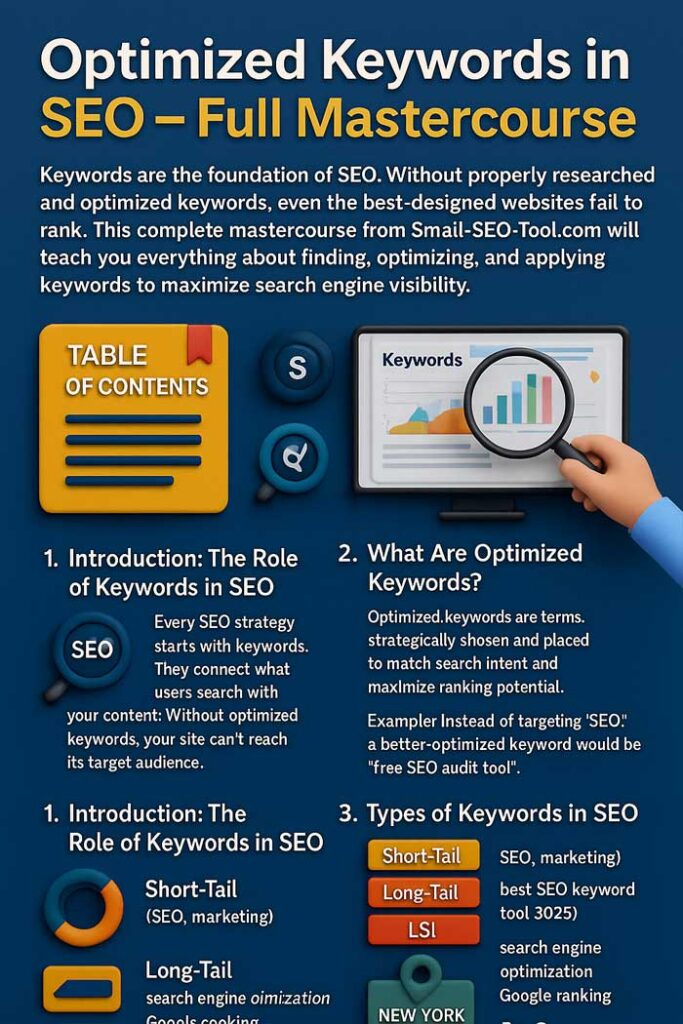Optimized Keywords in SEO – Full Mastercourse
Keywords are the foundation of SEO. Without properly researched and optimized keywords, even the best-designed websites fail to rank. This complete mastercourse from Small-SEO-Tool.com will teach you everything about finding, optimizing, and applying keywords to maximize search engine visibility.
What you learn here
- The Role of Keywords in SEO
- What Are Optimized Keywords?
- Types of Keywords in SEO
- Short-Tail Keywords
- Long-Tail Keywords
- LSI Keywords
- Geo-Targeted Keywords
- Branded vs. Non-Branded Keywords
- Importance of Optimized Keywords in SEO
- Google’s Keyword Ranking Factors
- Keyword Research Fundamentals
- Advanced Keyword Research Strategies
- Tools for Keyword Research
- Keyword Mapping & Site Architecture
- Keyword Density & Usage Best Practices
- LSI & Semantic Keywords for SEO
- Long-Tail Keyword Optimization
- On-Page SEO & Keyword Placement
- Off-Page SEO & Keyword Integration
- Mobile SEO Keyword Optimization
- Voice Search & Conversational Keywords
- Local SEO & Geo-Keywords
- Keyword Optimization for E-commerce
- Blog SEO & Keywords
- Keywords in Meta Tags & Descriptions
- Optimizing Keywords in URLs
- Keywords in Headings & Subheadings
- Image Alt Text & Keyword Optimization
- Anchor Text & Internal Linking Strategy
- Avoiding Keyword Stuffing & Penalties
- Tracking Keyword Performance
- Advanced Tools for Keyword Analysis
- AI & Keyword Optimization (2025 Trends)
- Case Studies: Winning with Optimized Keywords
- Common Mistakes in Keyword Optimization
- SEO Keyword Checklist for 2025
1. The Role of Keywords in SEO
Every SEO strategy starts with keywords. They connect what users search with your content. Without optimized keywords, your site can’t reach its target audience.
2. What Are Optimized Keywords?
Optimized keywords are terms strategically chosen and placed to match search intent and maximize ranking potential.
Example: Instead of targeting “SEO”, a better-optimized keyword would be “free SEO audit tool”.
3. Types of Keywords in SEO
- Short-Tail Keywords: Broad, high-volume terms (SEO, marketing).
- Long-Tail Keywords: Specific, lower-competition terms (best SEO keyword tool 2025).
- LSI Keywords: Related terms that help context (search engine optimization, Google ranking).
- Geo-Targeted Keywords: Localized searches (SEO agency New York).
- Branded vs. Non-Branded: Nike running shoes vs. best running shoes.
4. Importance of Optimized Keywords in SEO
- Drive targeted traffic
- Improve conversion rates
- Boost search rankings
- Enhance content relevancy
5. Google’s Keyword Ranking Factors
- Search intent match
- Keyword relevance
- CTR (Click-Through Rate)
- Content depth & keyword variety
- Page experience & Core Web Vitals
6. Keyword Research Fundamentals
Start with seed keywords, then expand into related terms.
Tool: Keyword Research Tool
7. Advanced Keyword Research Strategies
- Competitor keyword gap analysis
- Trend-based keyword discovery
- Question-based keyword research (what is SEO, how to optimize keywords)
8. Tools for Keyword Research
- Google Keyword Planner
- Ahrefs
- SEMrush
- Small-SEO-Tool Keyword Finder
9. Keyword Mapping & Site Architecture
Assign primary keywords to each page. Avoid keyword cannibalization.
10. Keyword Density & Usage Best Practices
Maintain 1–2% keyword density. Use naturally in:
- Title
- H1 & H2
- First 100 words
- Meta description
- Image alt text
Tool: Keyword Density Checker
11. LSI & Semantic Keywords for SEO
Search engines now rely on semantic search. Use related terms to improve context.
12. Long-Tail Keyword Optimization
These keywords have lower competition and higher conversion rates.
13. On-Page SEO & Keyword Placement
Optimized keywords should appear in:
- Title Tag
- Meta Description
- URL
- H1 & H2
- First paragraph
14. Off-Page SEO & Keyword Integration
Use keywords in:
- Anchor text of backlinks
- Social media descriptions
- Guest posts
15. Mobile SEO Keyword Optimization
Mobile searches often use conversational, short phrases.
16. Voice Search & Conversational Keywords
Voice searches are long, natural, and question-based.
Example: “What is the best free SEO keyword tool in 2025?”
17. Local SEO & Geo-Keywords
Use city names, zip codes, and “near me” phrases for local SEO.
18. Keyword Optimization for E-commerce
Include product-related keywords in:
- Product titles
- Meta descriptions
- Image alt text
19. Blog SEO & Keywords
Blogging allows natural keyword integration. Each post should target one primary keyword.
20. Keywords in Meta Tags & Descriptions
Google may not rank based solely on meta tags, but they impact CTR.
21. Optimizing Keywords in URLs
SEO-friendly URL:
❌ www.site.com/page?id=123
✅ www.site.com/seo-keyword-optimization
22. Keywords in Headings & Subheadings
Headings help search engines and users scan content.
23. Image Alt Text & Keyword Optimization
Use descriptive filenames & alt text:
❌ img123.jpg
✅ optimized-seo-keywords.jpg
24. Anchor Text & Internal Linking Strategy
Internal linking spreads keyword relevance.
Example: Link “optimized keywords” → SEO Audit Tool
25. Avoiding Keyword Stuffing & Penalties
Over-optimizing keywords risks Google penalties. Balance is key.
26. Tracking Keyword Performance
Use tools like Google Search Console to monitor rankings.
27. Advanced Tools for Keyword Analysis
- Keyword gap analyzers
- SERP analyzers
- Competitor tracking tools
28. AI & Keyword Optimization (2025 Trends)
AI helps predict keyword trends, analyze intent, and optimize content.
29. Case Studies: Winning with Optimized Keywords
Example: A blog targeting “SEO keyword tools” ranked top 3 on Google after shifting focus from short-tail to long-tail keywords.
30. Common Mistakes in Keyword Optimization
- Stuffing
- Targeting wrong audience
- Ignoring long-tail terms
- Repeating the same keyword in multiple pages

31. SEO Keyword Checklist for 2025
- Primary keyword in Title & H1
- LSI keywords in body text
- Natural keyword density
- Optimized URLs
- Internal linking with keyword anchors
FAQs
Q1: What’s the best keyword density for SEO?
A: 1–2% is safe.
Q2: Should I focus on short-tail or long-tail keywords?
A: Long-tail is better for conversions, short-tail for traffic.
Q3: Do keywords in meta descriptions help SEO?
A: Indirectly — they improve CTR.
Q4: Can I rank without keywords?
A: No — keywords are essential for discoverability.
Q5: What’s the best free keyword tool?
A: The Keyword Research Tool from Small-SEO-Tool.com.
optimized keywords SEO, keyword research, keyword density, long-tail keywords, SEO keyword optimization, LSI keywords, keyword ranking, keyword tools, on-page SEO keywords
Conclusion & Next Steps
Optimized keywords are the engine of SEO success. Without them, content has no direction. With them, you’ll dominate rankings.
👉 Start optimizing with the Keyword Research Tool today.


